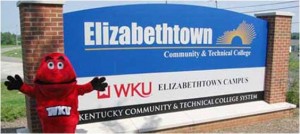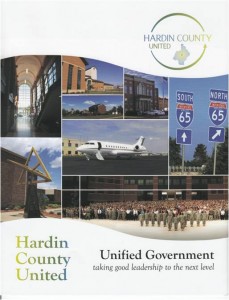Introduction
Hardin County United (HCU) was formed following the conclusion of the Hardin County Vision Project in 2010. HCU was formed by several community leaders that participated in the vision project and who wanted to continue with the process. HCU was formed primarily to address each of the 24 strategic goals which were adopted in the visioning process, assign a priority to each goal and develop an implementation strategy for each of the goals selected for implementation. L.B. Schmidt & Associates, LLC followed-up its involvement with the vision project by providing management and consulting services to HCU.
Organization Structure
HCU started with a Steering Committee comprised of around 60 people. The organization was further organized with three subcommittees: Community Development, Education and Governance.
Catalyst for Change
Early on, Luke Schmidt worked with the HCU Steering Committee and developed a logo and a web site, so that the organization would have a central theme and also a portal for information on its projects to be made available to all citizens.
 Since its inception, HCU has served as an agent for change. Following-up on the overall vision project theme of unification and the elimination of duplication in the community, HCU Community Development Subcommittee members supported the merger of four previously existing chambers of commerce (Elizabethtown, Radcliff, Vine Grove and West Point) into one new unified chamber – the Hardin County Chamber of Commerce – now one of the five largest chambers in Kentucky.
Since its inception, HCU has served as an agent for change. Following-up on the overall vision project theme of unification and the elimination of duplication in the community, HCU Community Development Subcommittee members supported the merger of four previously existing chambers of commerce (Elizabethtown, Radcliff, Vine Grove and West Point) into one new unified chamber – the Hardin County Chamber of Commerce – now one of the five largest chambers in Kentucky.
Community Development Subcommittee members also supported change in the community’s alcoholic beverage laws.
Three petitions were filed in Elizabethtown, Radcliff and Vine Grove (the county’s three largest cities) for local option elections to be held on the same date. Each campaign called for each community to go “wet,” meaning that individuals would gain the opportunity to purchase alcoholic beverages either by the package or by the drink.
HCU was one of the first organizations to endorse each campaign.
Each campaign was successful, thereby achieving one of the primary goals of the 24 strategic goals which were established during the Hardin County Vision Project.
The Education Subcommittee developed and implemented the first-ever mapping campaign of all educational offerings in the community
The goal of this project was to identify every educational offering currently available to all residents in Hardin County. The process started with pre-natal care classes for expectant parents, continued with early childcare development, Kindergarten, K – 8, high school and post-secondary offerings.
The report provided by the Education Subcommittee will be used by economic development professionals as part of their pitch to business and industrial prospects who are interested in expanding to the community.
 The Education Subcommittee also embraced the idea of an Area Technology Center (one of the vision project’s 24 strategic goals). Early in 2013, a partnership consisting of the Central Kentucky Community Foundation, Elizabethtown Community & Technical College, Hardin County Schools and Western Kentucky University announced the development of the new Early College & Career Center, which will be located adjacent to the ECTC campus and open for business in 2014.
The Education Subcommittee also embraced the idea of an Area Technology Center (one of the vision project’s 24 strategic goals). Early in 2013, a partnership consisting of the Central Kentucky Community Foundation, Elizabethtown Community & Technical College, Hardin County Schools and Western Kentucky University announced the development of the new Early College & Career Center, which will be located adjacent to the ECTC campus and open for business in 2014.
HCU’s Governance Subcommittee launched an initiative first designed to look into the potential benefits of unified government in Hardin County (again, following-up on the overall unification theme from the visioning process) with its Hardin County Unified Government Project.
L.B. Schmidt & Associates, LLC was retained to conduct extensive research into unified government. This included site visits to communities that had previously unified, interviews with key groups, an analysis of existing local government structures in Hardin County, etc.
HCU presented the findings of the research project to the community with a series of 24 forums around the county. HCU worked with Members of the Kentucky General Assembly to strengthen the existing statute on unified government in the Commonwealth. HCU also started preliminary work with local elected officials to establish a Unification Review Commission for the purpose of drafting a plan for unified government to be presented to citizens for review and approval.
###









